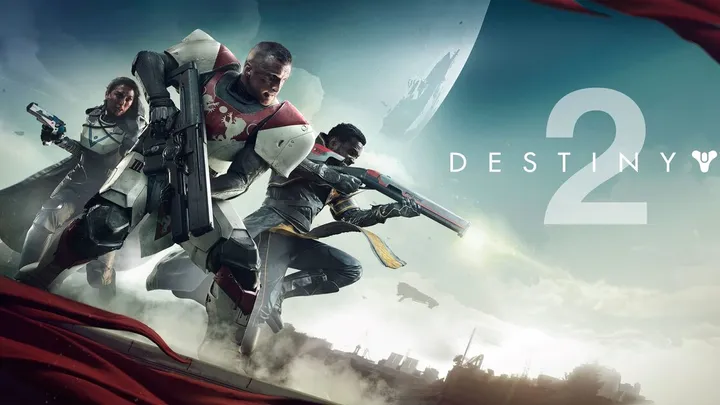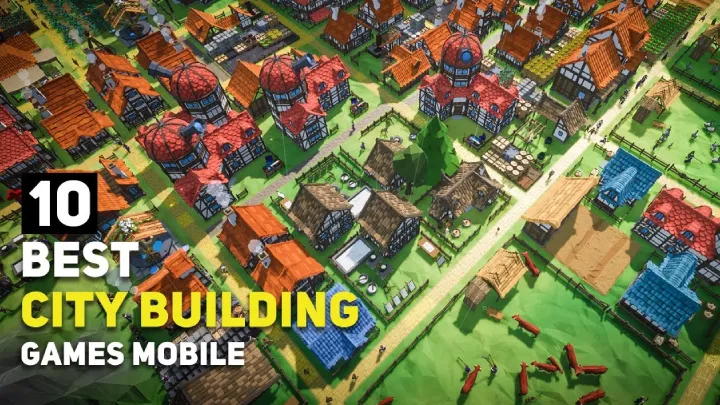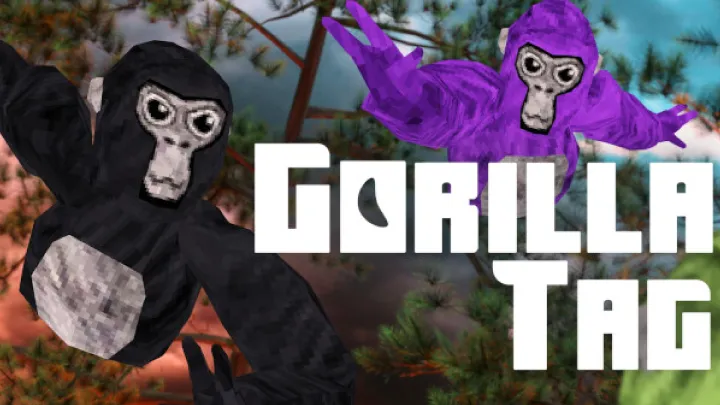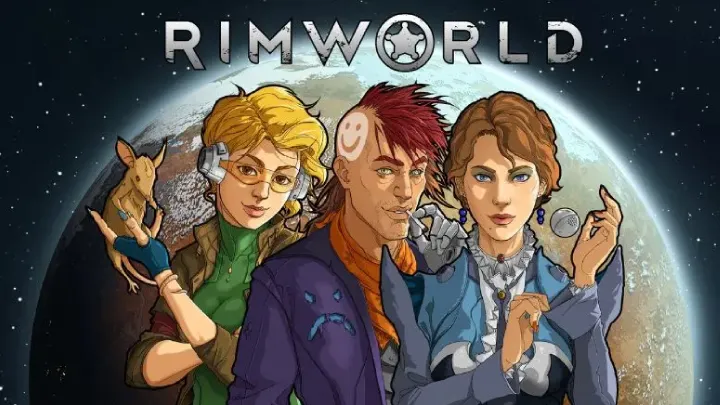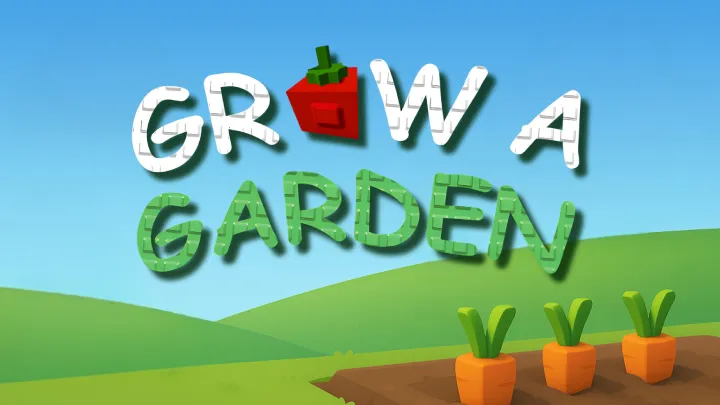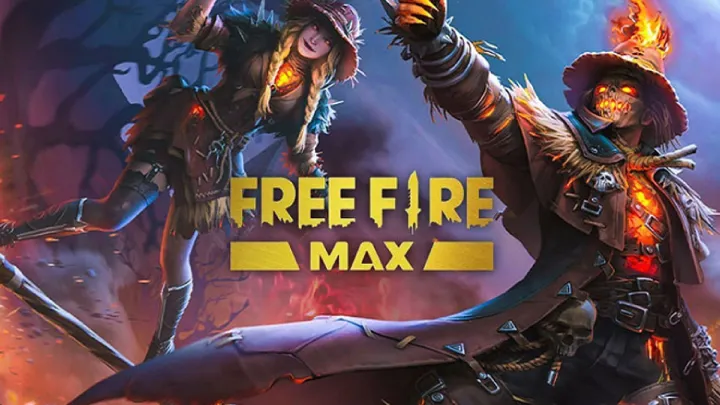The conversation around mental health has changed dramatically in the last decade. Once stigmatized and overlooked, mental health is now considered an essential part of overall well-being. Yet, despite this progress, many people still struggle to access affordable and effective therapy. Long waiting lists, geographic barriers, and high costs continue to make in-person counseling inaccessible for millions.
By 2025, technology has stepped in to fill this gap with digital therapy apps that bring counseling, emotional support, and wellness tools directly to people’s smartphones. These apps combine licensed therapists, evidence-based interventions, and artificial intelligence (AI)–driven self-help features to deliver convenient and affordable care. Whether someone is dealing with stress, anxiety, depression, or simply wants to improve emotional resilience, there’s an app designed to help.
In this article, we’ll explore the Top 10 Mental Health Therapy Apps in 2025, breaking down their strengths, weaknesses, pricing, and suitability for different users.
1. BetterHelp – The World’s Largest Online Therapy Platform
BetterHelp has been a pioneer in digital therapy, and by 2025, it continues to dominate as the largest online counseling platform globally. It connects users with licensed therapists across specialties such as anxiety, depression, trauma, and relationship counseling.
How It Works
Users sign up, fill out a detailed questionnaire about their mental health history and goals, and are then matched with a therapist. Sessions can be held through video, audio, or chat, with the flexibility to message therapists between scheduled appointments.
Pros
- Wide pool of licensed professionals
- Multiple communication options (chat, video, audio)
- Financial aid available for eligible users
Cons
- Can be expensive without discounts
- Therapist quality may vary depending on location and demand
Pricing in 2025
BetterHelp remains subscription-based, costing around $65–$90 per week, with unlimited messaging and one live session per week included.
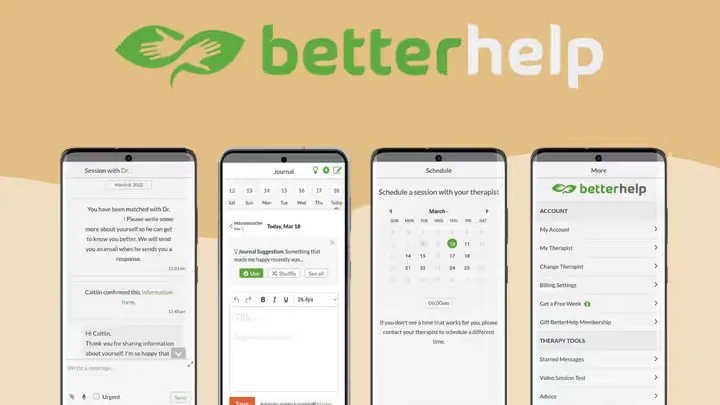
2. Talkspace – Therapy and Psychiatry in One App
Talkspace has carved out a niche by offering not only counseling but also psychiatry services for medication management. By 2025, it has expanded AI screening tools that match clients with therapists or psychiatrists within hours.
Features
Talkspace users can choose between messaging-only therapy or combine it with weekly live video sessions. The app also provides access to licensed psychiatrists who can prescribe medications when necessary, making it a comprehensive mental health platform.
Pros
- Combines therapy and psychiatry
- Flexible plans for different budgets
- Insurance coverage increasingly available
Cons
- Messaging-only plans may feel impersonal
- Higher-tier plans can be costly
Pricing in 2025
Plans range from $69 per week for text-based therapy to $120+ per week for video and psychiatry services. Many employers and insurance providers now subsidize Talkspace.
3. Calmerry – Affordable Therapy for Everyday Stress
Calmerry is designed for people seeking affordable, accessible therapy without long wait times. It connects users with licensed counselors within 24 hours and focuses heavily on stress, anxiety, and everyday emotional challenges.
Highlights
Calmerry’s biggest advantage is affordability. It offers structured weekly and monthly plans that are more budget-friendly than many competitors. The app also provides journaling tools, mood trackers, and CBT (Cognitive Behavioral Therapy)–based exercises.
Pros
- One of the most affordable therapy apps
- Quick therapist matching
- Integrated self-help and journaling features
Cons
- Limited range of specialized therapists compared to larger platforms
- Fewer live session options
Pricing in 2025
Subscriptions start at $45 per week, making Calmerry one of the best options for those on a budget.
4. ReGain – Therapy for Relationships and Couples
ReGain specializes in relationship and couples counseling, helping partners address issues such as communication, trust, and intimacy. By 2025, the app has expanded to include AI-driven couple assessments and guided exercises that supplement therapy sessions.
How It Works
Couples can share a joint account to message their therapist, or they can book private one-on-one sessions. The app is particularly useful for long-distance couples or those who prefer discreet counseling.
Pros
- Focused entirely on relationships
- Option for individual or joint sessions
- Affordable compared to traditional couples therapy
Cons
- Not ideal for severe individual mental health issues
- Requires both partners to be equally engaged
Pricing in 2025
Plans average $70–$100 per week, including unlimited messaging and one video session.
5. Pride Counseling – Inclusive Therapy for LGBTQ+ Communities
Mental health care often needs to be tailored for marginalized communities, and Pride Counseling fills this gap by focusing on the LGBTQ+ population. In 2025, it offers therapists with experience in gender identity, sexuality, and minority stress.
Features
Pride Counseling provides both messaging and live sessions, ensuring confidentiality and sensitivity. The app is also integrated with LGBTQ+ support groups and resources, offering a holistic approach to care.
Pros
- Therapists specialized in LGBTQ+ issues
- Safe and inclusive environment
- Flexible communication methods
Cons
- Limited therapist availability in some regions
- Pricing similar to mainstream apps
Pricing in 2025
Costs range from $65–$90 per week, with financial aid available.
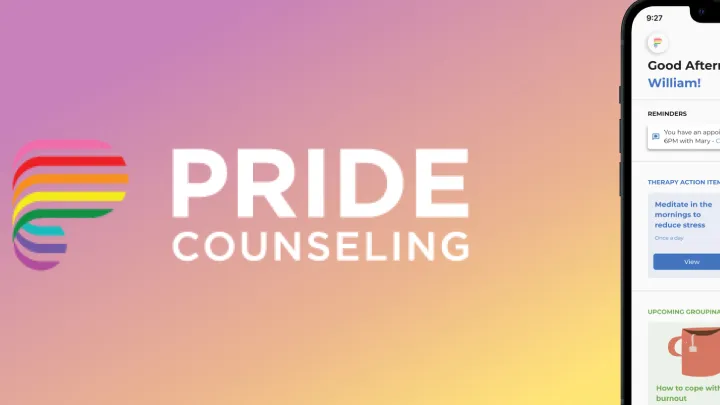
6. 7 Cups – Emotional Support Anytime, Anywhere
7 Cups is unique because it offers both peer-to-peer support and access to licensed therapists. It’s ideal for people who want immediate emotional support without waiting for an appointment.
How It Works
Users can connect with trained volunteer listeners 24/7 for free or choose a paid subscription for licensed therapy. This dual system ensures support for people at all levels of need.
Pros
- Free 24/7 chat with volunteer listeners
- Affordable therapy subscription
- Supportive community forums
Cons
- Volunteer listeners are not professionals
- Therapy features are less robust than competitors
Pricing in 2025
Therapy subscriptions start at $40 per week, one of the lowest on the market.
7. Woebot – AI-Powered Mental Health Companion
Woebot is an AI-driven mental health chatbot that uses CBT techniques to help users manage negative thoughts, stress, and anxiety. By 2025, it has become more sophisticated, using conversational AI that feels almost human.
Highlights
Woebot is not a replacement for therapy but acts as a 24/7 companion that teaches coping strategies and tracks mood patterns. It’s especially popular among younger users who prefer tech-driven solutions.
Pros
- Available anytime, anywhere
- Free or low-cost access
- Evidence-based CBT approach
Cons
- Not a substitute for licensed therapy
- Limited for complex mental health conditions
Pricing in 2025
The basic version is free, while premium subscriptions with advanced features cost $9–$15 per month.
8. Cerebral – Comprehensive Care With Medication Management
Cerebral has grown rapidly as a platform combining therapy, psychiatry, and medication management. By 2025, it integrates AI monitoring tools that alert clinicians to signs of worsening conditions like depression or bipolar disorder.
Features
Cerebral users are matched with care counselors, therapists, and prescribing providers. The app ensures continuity of care, with monthly check-ins for medication management.
Pros
- Holistic mental health care (therapy + psychiatry + prescriptions)
- Insurance coverage available
- Data-driven monitoring tools
Cons
- Higher cost compared to basic therapy apps
- Requires regular internet connectivity
Pricing in 2025
Plans range from $95–$150 per week, depending on whether therapy and medication are combined.
9. TalkLife – Social Support for Young People
TalkLife is a mental health community app designed primarily for teens and young adults. In 2025, it has become one of the largest peer-support networks, with gamified features that encourage users to share and support one another.
How It Works
TalkLife isn’t a therapy app in the traditional sense but offers safe spaces for people to express feelings, connect with peers, and reduce isolation. Professional moderators ensure discussions remain supportive and safe.
Pros
- Massive peer-support community
- Gamified interaction encourages engagement
- Especially supportive for students and young people
Cons
- Not a substitute for licensed therapy
- Risks of peer advice being unprofessional
Pricing in 2025
Free to use, with optional premium features at $5–$10 per month.
10. Larkr – On-Demand Therapy Sessions
Larkr is designed for flexibility, allowing users to schedule on-demand video sessions with licensed therapists. By 2025, it has expanded into global markets and introduced AI triage systems that match users with the right therapist instantly.
Highlights
Unlike subscription-based apps, Larkr lets users pay per session, making it suitable for those who prefer occasional therapy rather than ongoing plans.
Pros
- Pay-per-session flexibility
- Wide therapist availability
- Integrated mood tracking and mindfulness tools
Cons
- More expensive per session compared to subscriptions
- Limited self-help resources compared to others
Pricing in 2025
Sessions average $85–$120 per session, depending on therapist expertise.
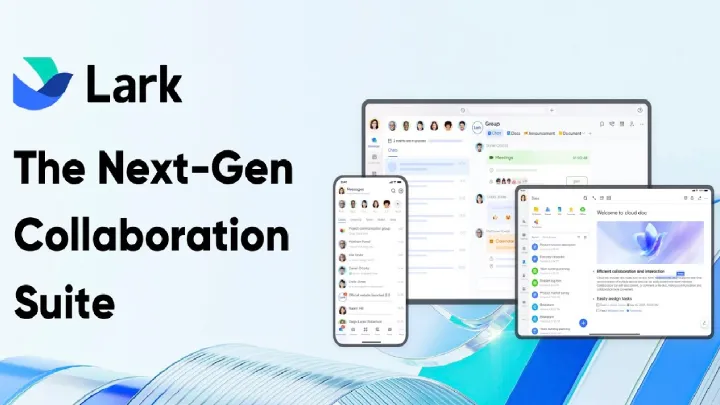
Future Trends in Digital Mental Health (2025–2030)
- AI Integration – Apps will increasingly use AI to detect early warning signs of mental illness.
- Global Access – Expansion into underserved regions, bridging mental health care gaps worldwide.
- Hybrid Care – Combining in-person therapy with app-based support for continuity.
- Insurance Partnerships – More insurers will cover digital therapy, reducing costs.
- Personalized Care – Data-driven insights will tailor therapy plans to individuals.
Conclusion
The top 10 mental health therapy apps of 2025 show how far digital counseling has come. From large platforms like BetterHelp and Talkspace to niche apps like Pride Counseling and ReGain, there’s now an option for nearly every need and budget. AI-driven tools like Woebot and community-based platforms like TalkLife demonstrate that support doesn’t always have to come in the form of traditional therapy.
While these apps don’t fully replace in-person care for severe mental health conditions, they make support more accessible, affordable, and stigma-free. Choosing the right app depends on one’s personal needs, financial situation, and comfort with technology. In 2025 and beyond, mental health is no longer confined to clinics—it’s in our pockets, ready whenever we need it.





